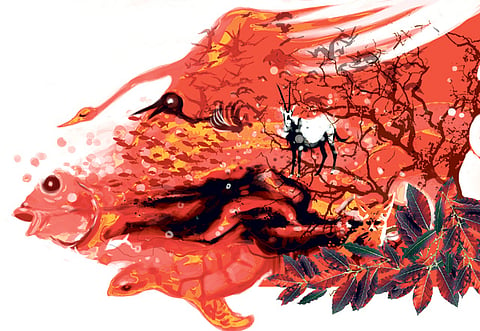Middle East faces severe biodiversity threat
In the Arab region, 24 per cent of fish, 22 per cent of birds and 20 per cent of mammals are threatened with extinction

The importance of biological diversity to human society is hard to overstate. An estimated 40 per cent of the global economy is based on biological products and processes. Poor people, especially those living in areas of low agricultural productivity, depend especially heavily on the genetic diversity of the environment. The effective use of biodiversity at all levels — genes, species and ecosystems — is therefore a precondition for sustainable development. However, human activities the world over are causing the progressive loss of species of plants and animals at a rate far higher than the natural background rate of extinction.
In April 2002, governments at the sixth meeting of the Conference of the Parties to the Convention on Biological Diversity, which is administered under the United Nations Environment Programme's (UNEP's) aegis, agreed "to achieve by 2010 a significant reduction of the current rate of biodiversity loss at the global, regional and national levels as a contribution to poverty alleviation and to the benefit of all life on Earth". This target was endorsed by the World Summit on Sustainable Development, and is the focus for UNEP's biodiversity-related activities. Biodiversity refers to the uncounted variety of living things on the planet. These living organisms, interacting among themselves and with the non-living environment, comprise the ecosystems of the world. They supply food, medicines, timber and fuel, and play a fundamental role in providing breathable air, conserving soils and stabilising climates.
These benefits, or ‘ecosystem services', which are ultimately essential for human life on Earth, are the basis of a range of industries, from agriculture and biotechnology to fisheries and ecotourism. The value of ecosystem services was the subject of the five-year Millennium Ecosystem Assessment (MA), in which UNEP was a partner. The MA concluded in 2005, and its synthesis reports reveal that ecosystem services are habitually undervalued, at an uncountable cost to society, especially the poor who rely most heavily on the planet's natural capital for health and livelihoods.
This year, 2010, marks an important "Biodiversity Milestone" at several levels. Firstly, 2010 is the year of Nagoya, Japan, which will be hosting the Convention on Biological Diversity (CBD) Conference of Parties, COP 10, in October to consider the strategic issues for evaluating progress and supporting implementation of the Convention.
It is regrettable to note that we are in a situation where the Earth is experiencing unprecedented biodiversity loss with rates increasing rather than being reduced. Today, biodiversity loss is 1,000 times more than it was 50 years ago. The Human Ecological Footprint has reached 1.4 times the Earth's biological capacity. This means we need 1.4 Planet Earths to sustain us, and this number is growing, alongside the human population. To reduce this overwhelming burden on the planet and its biodiversity, we need to change our lifestyles and we need to change them quickly.
Alarming trends
We need to act to curb the alarming trends highlighted by the Environment Outlook for the Arab Region, which identified 1,084 threatened species in the Arab region; with 24 per cent of fish, 22 per cent of birds, and 20 per cent of mammals in the region threatened with extinction. Ecosystems in West Asia are undergoing massive pressures from overexploitation, such as overfishing and marine construction, triggered by one of the highest rates of urban population growth worldwide. Some habitats are showing signs of irreversible collapse after being pushed beyond their ecological thresholds or "tippingpoints". Urgent proactive and preventive interventions are necessary to avoid these extreme situations.
To coincide with the target year, the UN General Assembly proclaimed 2010 as the "International Year of Biodiversity." The primary objectives of this important year are to effectively communicate to different target audiences the value of biodiversity, and to motivate them to conserve and promote sustainable practices. But above all, we should take time to celebrate the web of life that sustains us all. The International Year of Biodiversity will raise political attention to the vital role that biodiversity plays in people's lives.
At the forthcoming 56th session of the UN General Assembly in September, Secretary-General Ban Ki-moon will invite the heads of state of 193 countries to commemorate their commitment to biodiversity conservation by signing a binding agreement. This important event will strengthen the elaboration and enforcement of legislative action by governments and integrate biodiversity conservation and sustainable use across all relevant sectors and communities.
A strategic plan is being sought that is more realistic, bold, and based on sound science and that integrates the distinctive needs of various regions, including the Arab region. The plan will be based on accurate indicators to measure with more precision achievements in reducing biodiversity loss.
Arab countries are expected to contribute actively to finalising the national reports, which are a rich source of data to assess biodiversity status around the world and provide the basis for innovative solutions for the future. The submission of accurate and detailed national reports will help achieve a more comprehensive vision that will guarantee that countries' needs are addressed in the new strategic plan.
This is the International Year of Biodiversity and a great opportunity for us to celebrate all life on Earth. Within the West Asia region UNEP is undertaking a range of activities in celebration of this. We have crafted with the governments a series of local events in which biodiversity is being highlighted and awareness raised. We hope to see a range of activities throughout the region, culminating in the International Day on May 22.
Habib El Habr is director and regional representative of the UN Environment Programme for West Asia.


